Machine Learning Applications in Renewable Energy (MLARE) Research: A Publication Trend and Bibliometric Analysis Study (2012–2021)
Abstract
1. Introduction
2. Methodology
3. Results and Discussion
3.1. Published Documents Analysis
3.2. Authors and Affiliations
3.3. Funding Organisations
3.4. Keyword Co-Occurrence
4. Conclusions
Author Contributions
Funding
Institutional Review Board Statement
Informed Consent Statement
Data Availability Statement
Conflicts of Interest
References
- Adom, F.; Dunn, J.B.; Han, J.; Sather, N. Life-cycle fossil energy consumption and greenhouse gas emissions of bio-derived chemicals and their Conventional counterparts. Environ. Sci. Technol. 2014, 48, 14624–14631. [Google Scholar] [CrossRef] [PubMed]
- Siddik, M.; Islam, M.; Zaman, A.K.; Hasan, M. Current status and correlation of fossil fuels consumption and greenhouse gas emissions. Int. J. Energy Environ. Econ 2021, 28, 103–119. [Google Scholar]
- Kikuchi, R. Environmental and socio-economic factors in carbon offsets: An approach to sustainable management and planning in climate change strategy. J. Environ. Plan. Manag. 2011, 54, 355–367. [Google Scholar] [CrossRef]
- Omri, A.; Belaïd, F. Does renewable energy modulate the negative effect of environmental issues on the socio-economic welfare? J. Environ. Manag. 2021, 278, 111483. [Google Scholar] [CrossRef] [PubMed]
- Johari, A.; Nyakuma, B.B.; Nor, S.H.; Mat, R.; Hashim, H.; Ahmad, A.; Zakaria, Z.Y.; Abdullah, T.A. The challenges and prospects of palm oil based biodiesel in Malaysia. Energy 2015, 81, 255–261. [Google Scholar] [CrossRef]
- Wong, S.L.; Nyakuma, B.B.; Nordin, A.H.; Lee, C.T.; Ngadi, N.; Wong, K.Y.; Oladokun, O. Uncovering the dynamics in global carbon dioxide utilization research: A bibliometric analysis (1995–2019). Environ. Sci. Pollut. Res. 2021, 28, 13842–13860. [Google Scholar] [CrossRef]
- York, R.; Bell, S.E. Energy transitions or additions? Why a transition from fossil fuels requires more than the growth of renewable energy. Energy Res. Soc. Sci. 2019, 51, 40–43. [Google Scholar] [CrossRef]
- Kalair, A.; Abas, N.; Saleem, M.S.; Kalair, A.R.; Khan, N. Role of energy storage systems in energy transition from fossil fuels to renewables. Energy Storage 2021, 3, e135. [Google Scholar] [CrossRef]
- Turkenburg, W.C.; Faaij, A. Renewable Energy Technologies. UNDP/UNDESA/WEC: Energy and the Challenge of Sustainability; World Energy Assessment: New York, NY, USA, 2000; pp. 219–272. [Google Scholar]
- Rabbi, F.; Ayaz, M.; Dayupay, J.P.; Oyebode, O.J.; Gido, N.G.; Adhikari, N.; Tabuena, A.C.; Ajibade, S.S.; Bassey, M.A. Gaussian Map to Improve Firefly Algorithm Performance. In Proceedings of the 2022 IEEE 13th Control and System Graduate Research Colloquium (ICSGRC), Shah Alam, Malaysia, 23 July 2022; pp. 88–92. [Google Scholar]
- Blaabjerg, F.; Ionel, D.M. Renewable energy devices and systems–state-of-the-art technology, research and development, challenges and future trends. Electr. Power Compon. Syst. 2015, 43, 1319–1328. [Google Scholar] [CrossRef]
- Yadav, A.; Pal, N.; Patra, J.; Yadav, M. Strategic planning and challenges to the deployment of renewable energy technologies in the world scenario: Its impact on global sustainable development. Environ. Dev. Sustain. 2020, 22, 297–315. [Google Scholar] [CrossRef]
- Sinsel, S.R.; Riemke, R.L.; Hoffmann, V.H. Challenges and solution technologies for the integration of variable renewable energy sources—A review. Renew. Energy 2020, 145, 2271–2285. [Google Scholar] [CrossRef]
- Owusu, P.A.; Asumadu-Sarkodie, S. A review of renewable energy sources, sustainability issues and climate change mitigation. Cogent Eng. 2016, 3, 1167990. [Google Scholar] [CrossRef]
- Subasi, A. Chapter 3—Machine learning techniques. In Practical Machine Learning for Data Analysis Using Python; Subasi, A., Ed.; Academic Press: Cambridge, MA, USA, 2020; pp. 91–202. [Google Scholar]
- Edgar, T.; Manz, D. Chapter 6—Machine Learning. In Research Methods for Cyber Security; Edgar, T.W., Manz, D.O., Eds.; Syngress: Oxford, UK, 2017; pp. 153–173. [Google Scholar]
- Doshi, M.; Varghese, A. Smart agriculture using renewable energy and AI-powered IoT. In AI, Edge and IoT-based Smart Agriculture; Elsevier: Amsterdam, The Netherlands, 2022; pp. 205–225. [Google Scholar]
- Woolf, B.P. Chapter 7-Machine Learning. In Building Intelligent Interactive Tutors; Morgan Kaufmann: Burlington, MA, USA, 2009; pp. 221–297. [Google Scholar]
- Madiajagan, M.; Raj, S.S. Chapter 1—Parallel Computing, Graphics Processing Unit (GPU) and New Hardware for Deep Learning in Computational Intelligence Research. In Deep Learning and Parallel Computing Environment for Bioengineering Systems; Sangaiah, A.K., Ed.; Academic Press: Cambridge, MA, USA, 2019; pp. 1–15. [Google Scholar]
- Bonetto, E. Chapter 8—Machine learning. In Computing in Communication Networks; Fitzek, F.H.P., Granelli, F., Seeling, P., Eds.; Academic Press: Cambridge, MA, USA, 2020; pp. 135–167. [Google Scholar]
- Perera, K.S.; Aung, Z.; Woon, W.L. Machine Learning Techniques for Supporting Renewable Energy Generation and Integration: A Survey. In Lecture Notes in Computer Science (Including Subseries Lecture Notes in Artificial Intelligence and Lecture Notes in Bioinformatics); Springer: Berlin/Heidelberg, Germany, 2014; pp. 81–96. [Google Scholar]
- Lu, S.; Hwang, Y.; Khabibrakhmanov, I.; Marianno, F.J.; Shao, X.; Zhang, J.; Hodge, B.-M.; Hamann, H.F. Machine learning based multi-physical-model blending for enhancing renewable energy forecast—Improvement via situation dependent error correction. In Proceedings of the European Control Conference (ECC 2015), Linz, Austria, 15–17 July 2015; Institute of Electrical and Electronics Engineers Inc: New York, NY, USA, 2015. [Google Scholar]
- Sogabe, T.; Ichikawa, H.; Sakamoto, K.; Yamaguchi, K.; Sogabe, M.; Sato, T.; Suwa, Y. Optimization of decentralized renewable energy system by weather forecasting and deep machine learning techniques. In Proceedings of the 2016 IEEE Innovative Smart Grid Technologies-Asia (ISGT-Asia 2016), Melbourne, VIC, Australia, 28 November–1 December 2016; IEEE Computer Society: Washington, DC, USA, 2016. [Google Scholar]
- Ahmed, W.; Ansari, H.; Khan, B.; Ullah, Z.; Ali, S.M.; Mehmood, C.A.A.; Qureshi, M.B.; Hussain, I.; Jawad, M.; Khan, M.U.S.; et al. Machine learning based energy management model for smart grid and renewable energy districts. IEEE Access 2020, 8, 185059–185078. [Google Scholar] [CrossRef]
- Rangel-Martinez, D.; Nigam, K.D.P.; Ricardez-Sandoval, L.A. Machine learning on sustainable energy: A review and outlook on renewable energy systems, catalysis, smart grid and energy storage. Chem. Eng. Res. Des. 2021, 174, 414–441. [Google Scholar] [CrossRef]
- Wang, H.; Lei, Z.; Zhang, X.; Zhou, B.; Peng, J. A review of deep learning for renewable energy forecasting. Energy Convers. Manag. 2019, 198, 111799. [Google Scholar] [CrossRef]
- Ahmad, T.; Chen, H. Deep learning for multi-scale smart energy forecasting. Energy 2019, 175, 98–112. [Google Scholar] [CrossRef]
- Helbing, G.; Ritter, M. Deep Learning for fault detection in wind turbines. Renew. Sustain. Energy Rev. 2018, 98, 189–198. [Google Scholar] [CrossRef]
- Zhang, C.Y.; Chen, C.P.; Gan, M.; Chen, L. Predictive deep Boltzmann machine for multiperiod wind speed forecasting. IEEE Trans. Sustain. Energy 2015, 6, 1416–1425. [Google Scholar] [CrossRef]
- Chang, G.W.; Lu, H.J. Integrating gray data preprocessor and deep belief network for day-ahead PV power output forecast. IEEE Trans. Sustain. Energy 2018, 11, 185–194. [Google Scholar] [CrossRef]
- Li, L.; Yuan, Z.; Gao, Y. Maximization of energy absorption for a wave energy converter using the deep machine learning. Energy 2018, 165, 340–349. [Google Scholar] [CrossRef]
- Wang, H.; Yi, H.; Peng, J.; Wang, G.; Liu, Y.; Jiang, H.; Liu, W. Deterministic and probabilistic forecasting of photovoltaic power based on deep convolutional neural network. Energy Convers. Manag. 2017, 153, 409–422. [Google Scholar] [CrossRef]
- Ajibade, S.S.M.; Dayupay, J.; Ngo-Hoang, D.L.; Oyebode, O.J.; Sasan, J.M. Utilization of Ensemble Techniques for Prediction of the Academic Performance of Students. J. Optoelectron. Laser 2022, 41, 48–54. [Google Scholar]
- Luo, X.; Sun, J.; Wang, L.; Wang, W.; Zhao, W.; Wu, J.; Wang, J.-H.; Zhang, Z. Short-term wind speed forecasting via stacked extreme learning machine with generalized correntropy. IEEE Trans. Ind. Inform. 2018, 14, 4963–4971. [Google Scholar] [CrossRef]
- Bedi, J.; Toshniwal, D. Deep learning framework to forecast electricity demand. Appl. Energy 2019, 238, 1312–1326. [Google Scholar] [CrossRef]
- Hua, H.; Qin, Y.; Hao, C.; Cao, J. Optimal energy management strategies for energy Internet via deep reinforcement learning approach. Appl. Energy 2019, 239, 598–609. [Google Scholar] [CrossRef]
- Salcedo-Sanz, S.; Cornejo-Bueno, L.; Prieto, L.; Paredes, D.; García-Herrera, R. Feature selection in machine learning prediction systems for renewable energy applications. Renew. Sustain. Energy Rev. 2018, 90, 728–741. [Google Scholar] [CrossRef]
- Gu, G.H.; Noh, J.; Kim, I.; Jung, Y. Machine learning for renewable energy materials. J. Mater. Chem. A 2019, 7, 17096–17117. [Google Scholar] [CrossRef]
- Lai, J.P.; Chang, Y.M.; Chen, C.H.; Pai, P.F. A survey of machine learning models in renewable energy predictions. Appl. Sci. 2020, 10, 5975. [Google Scholar] [CrossRef]
- Asrari, A.; Wu, T.X.; Ramos, B. A hybrid algorithm for short-term solar power prediction—Sunshine state case study. IEEE Trans. Sustain. Energy 2016, 8, 582–591. [Google Scholar] [CrossRef]
- Yu, J.; Park, J.H.; Kim, S. A New Input Selection Algorithm Using the Group Method of Data Handling and Bootstrap Method for Support Vector Regression Based Hourly Load Forecasting. Energies 2018, 11, 2870. [Google Scholar] [CrossRef]
- Bentéjac, C.; Csörgő, A.; Martínez-Muñoz, G. A comparative analysis of gradient boosting algorithms. Artif. Intell. Rev. 2021, 54, 1937–1967. [Google Scholar] [CrossRef]
- Gardner, M.W.; Dorling, S.R. Artificial neural networks (the multilayer perceptron)—A review of applications in the atmospheric sciences. Atmos. Environ. 1998, 32, 2627–2636. [Google Scholar] [CrossRef]
- Nayak, A.; Heistrene, L. Hybrid machine learning model for forecasting solar power generation. In Proceedings of the 2020 International Conference on Smart Grids and Energy Systems (SGES), Perth, Australia, 23–26 November 2020; IEEE: New York, NY, USA, 2020. [Google Scholar]
- Li, J.; Guo, Y.; Zhang, X.; Fu, Z. Using hybrid machine learning methods to predict and improve the energy consumption efficiency in oil and gas fields. Mob. Inf. Syst. 2021, 2021, 1–7. [Google Scholar] [CrossRef]
- Fayaz, M.; Kim, D. A prediction methodology of energy consumption based on deep extreme learning machine and comparative analysis in residential buildings. Electronics 2018, 7, 222. [Google Scholar] [CrossRef]
- Ajibade, S.S.M.; Ojeniyi, A. Bibliometric Survey on Particle Swarm Optimization Algorithms (2001–2021). J. Electr. Comput. Eng. 2022, 2022, 3242949. [Google Scholar] [CrossRef]
- Abramo, G.; D’Angelo, C.A.; Di Costa, F. Do interdisciplinary research teams deliver higher gains to science? Scientometrics 2017, 111, 317–336. [Google Scholar] [CrossRef]
- Abramo, G.; D’Angelo, C.A.; Di Costa, F. The effect of multidisciplinary collaborations on research diversification. Scientometrics 2018, 116, 423–433. [Google Scholar] [CrossRef]
- Lau, L.C.; Lee, K.T.; Mohamed, A.R. Global warming mitigation and renewable energy policy development from the Kyoto Protocol to the Copenhagen Accord—A comment. Renew. Sustain. Energy Rev. 2012, 16, 5280–5284. [Google Scholar] [CrossRef]
- Horowitz, A.D.; Lopez, M.F.; Ross, S.M.; Sparenberg, J.A. Paris agreement. Int. Leg. Mater. 2016, 55, 740–755. [Google Scholar] [CrossRef]
- Savaresi, A. The Paris Agreement: A new beginning? J. Energy Nat. Resour. Law 2016, 34, 16–26. [Google Scholar] [CrossRef]
- Babatunde, O.M.; Munda, J.L.; Hamam, Y. A comprehensive state-of-the-art survey on power generation expansion planning with intermittent renewable energy source and energy storage. Int. J. Energy Res. 2019, 43, 6078–6107. [Google Scholar] [CrossRef]
- Del Río, P.; Unruh, G. Overcoming the lock-out of renewable energy technologies in Spain: The cases of wind and solar electricity. Renew. Sustain. Energy Rev. 2007, 11, 1498–1513. [Google Scholar] [CrossRef]
- Lehmann, P.; Creutzig, F.; Ehlers, M.H.; Friedrichsen, N.; Heuson, C.; Hirth, L.; Pietzcker, R. Carbon lock-out: Advancing renewable energy policy in Europe. Energies 2012, 5, 323–354. [Google Scholar] [CrossRef]
- Magazzino, C.; Mele, M.; Morelli, G. The relationship between renewable energy and economic growth in a time of COVID -19: A machine learning experiment on the Brazilian economy. Sustainability 2021, 13, 1285. [Google Scholar] [CrossRef]
- Ma, T.; Guo, Z.; Lin, M.; Wang, Q. Recent trends on nanofluid heat transfer machine learning research applied to renewable energy. Renew. Sustain. Energy Rev. 2021, 138, 110494. [Google Scholar] [CrossRef]
- Abramo, G.; D’Angelo, C.A.; Di Costa, F. The collaboration behavior of top scientists. Scientometrics 2019, 118, 215–232. [Google Scholar] [CrossRef]
- Shagrir, L. Collaborating with colleagues for the sake of academic and professional development in higher education. Int. J. Acad. Dev. 2017, 22, 331–342. [Google Scholar] [CrossRef]
- Subramanyam, K. Bibliometric studies of research collaboration: A review. J. Inf. Sci. 1983, 6, 33–38. [Google Scholar] [CrossRef]
- Ye, Q.; Song, H.; Li, T. Cross-institutional collaboration networks in tourism and hospitality research. Tour. Manag. Perspect. 2012, 2, 55–64. [Google Scholar] [CrossRef]
- Adams, J.D.; Black, G.C.; Clemmons, J.R.; Stephan, P. E Scientific teams and institutional collaborations: Evidence from US universities, 1981–1999. Res. Policy 2005, 34, 259–285. [Google Scholar] [CrossRef]
- National Renewable Energy Laboratory. End-to-End Optimization for Battery Materials and Molecules by Combining Graph Neural Networks and Reinforcement Learning. ARPA Project 2022. Available online: https://bit.ly/3Q9VL3K (accessed on 30 December 2022).
- National Renewable Energy Laboratory. NREL Tool NREL Tool: Quick Answers for Chemical Reactions 2022. Available online: https://bit.ly/3G7LKiK (accessed on 30 December 2022).
- Li, J. Decarbonising power generation in China—Is the answer blowing in the wind? Renew. Sustain. Energy Rev. 2010, 14, 1154–1171. [Google Scholar] [CrossRef]
- Sajid, M.J.; Khan, S.A.R.; Gonzalez, E.D.S. Identifying contributing factors to China’s declining share of renewable energy consumption: No silver bullet to decarbonisation. Environ. Sci. Pollut. Res. 2022, 29, 1–16. [Google Scholar] [CrossRef] [PubMed]
- World Research Institute WRI. World’s Top 10 Emitters. Interactive Chart on Changes in the World’s Top 10 Emitters 2020. Available online: https://bit.ly/3WhK8tc (accessed on 16 December 2022).
- United Nations Climate Change. The Katowice climate package: Making The Paris Agreement Work For All. Climate Change 2022. Available online: https://bit.ly/2TUnCHh (accessed on 14 December 2022).
- United Nations. The Paris Agreement. United Nations and Climate Action 2022. Available online: https://bit.ly/3FuDBVo (accessed on 15 December 2022).
- Nyakuma, B.B.; Wong, S.; Mong, G.R.; Utume, L.N.; Oladokun, O.; Wong, K.Y.; Ivase, T.J.-P.; Abdullah, T.A.T. Bibliometric analysis of the research landscape on rice husks gasification (1995–2019). Environ. Sci. Pollut. Res. 2021, 28, 49467–49490. [Google Scholar] [CrossRef] [PubMed]
- Davies, B.; Gush, J.; Hendy, S.C.; Jaffe, A.B. Research funding and collaboration. Res. Policy 2022, 51, 104421. [Google Scholar] [CrossRef]
- Shin, H.; Kim, K.; Kogler, D.F. Scientific collaboration, research funding, and novelty in scientific knowledge. PLoS ONE 2022, 17, e0271678. [Google Scholar] [CrossRef] [PubMed]
- Confraria, H.; Blanckenberg, J.; Swart, C. Which factors influence international research collaboration in Africa? In Africa and the Sustainable Development Goals; Springer: Berlin/Heidelberg, Germany, 2020; pp. 243–255. [Google Scholar]
- Kwiek, M. Internationalists and locals: International research collaboration in a resource-poor system. Scientometrics 2020, 124, 57–105. [Google Scholar] [CrossRef]
- Ajibade, S.S.M.; Ahmad, N.B.B.; Zainal, A. Analysis of Metaheuristics Feature Selection Algorithm for Classification. In International Conference on Hybrid Intelligent Systems; Springer: Cham, Switzerland, 2021; pp. 214–222. [Google Scholar]
- Zhang, L.; Chen, X.; Piao, E.; Jin, Y.; Wang, H.; Yu, J. The analysis on the research hotspot and trend of think tanks of Chinese university libraries. J. Comput. Commun. 2020, 8, 101. [Google Scholar]
- She, Y.; Xu, D.; Tan, Z.; Zhao, J. Research Hotspot and Trend Analysis of Anonymous Communication Based on Citespace. In Proceedings of the 2022 3rd International Conference on Information Science, Parallel and Distributed Systems (ISPDS), Guangzhou, China, 22–24 July 2022; IEEE: New York, NY, USA, 2022. [Google Scholar]
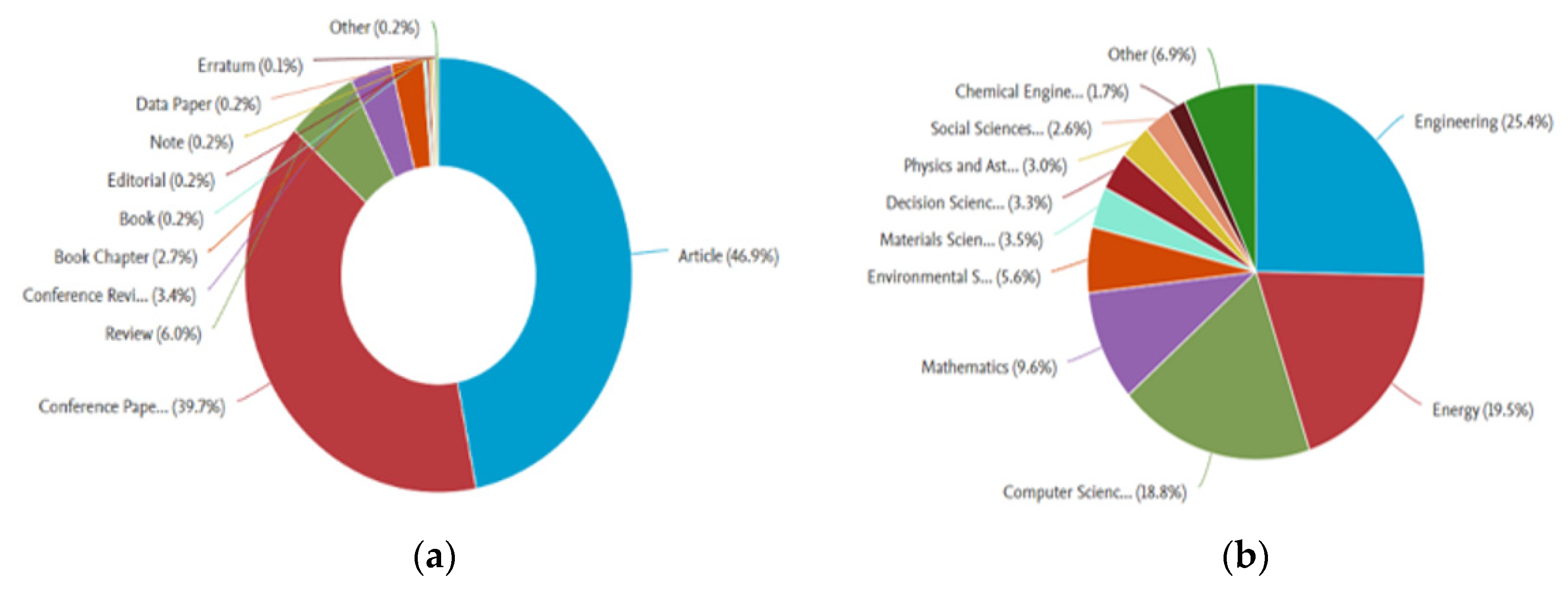
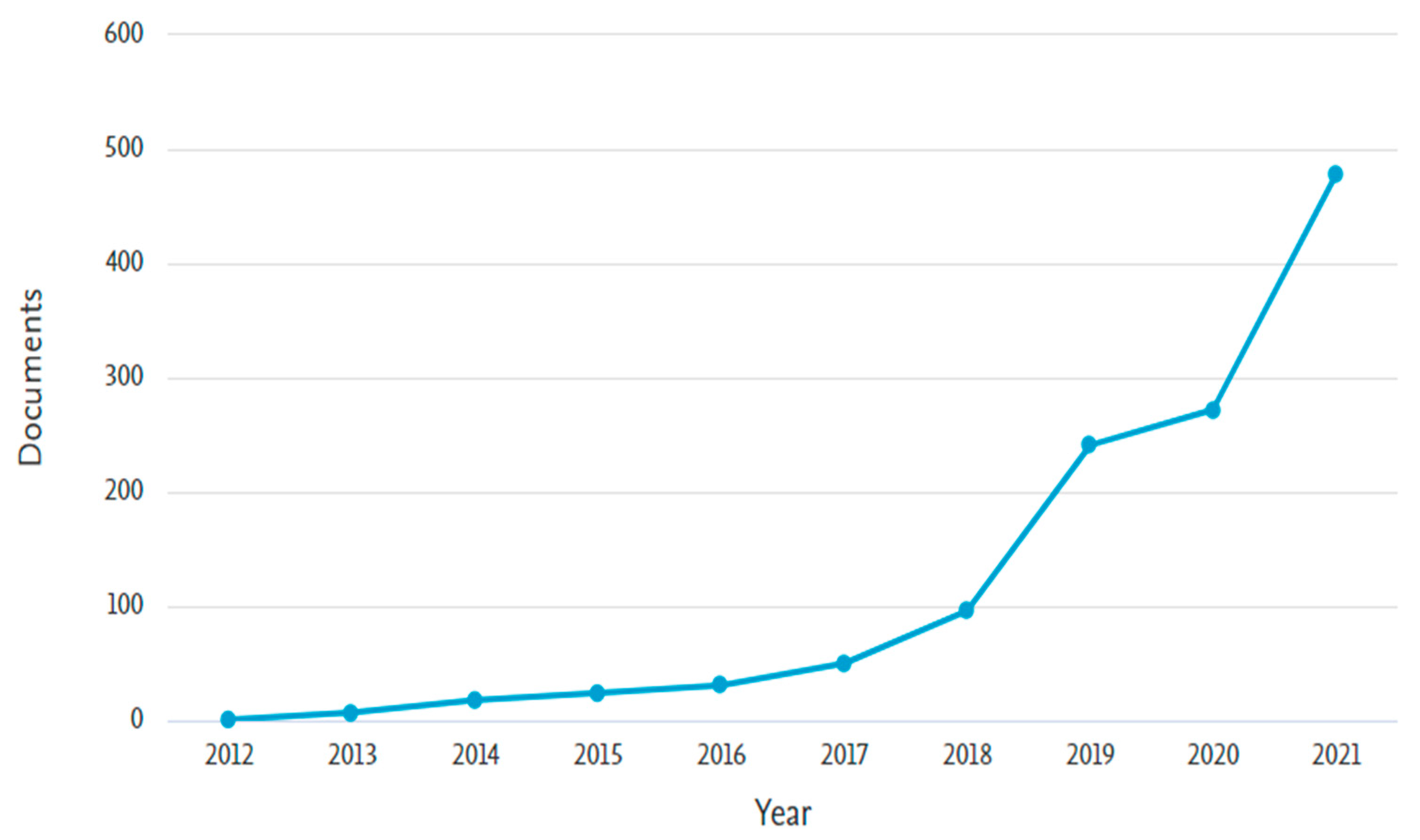

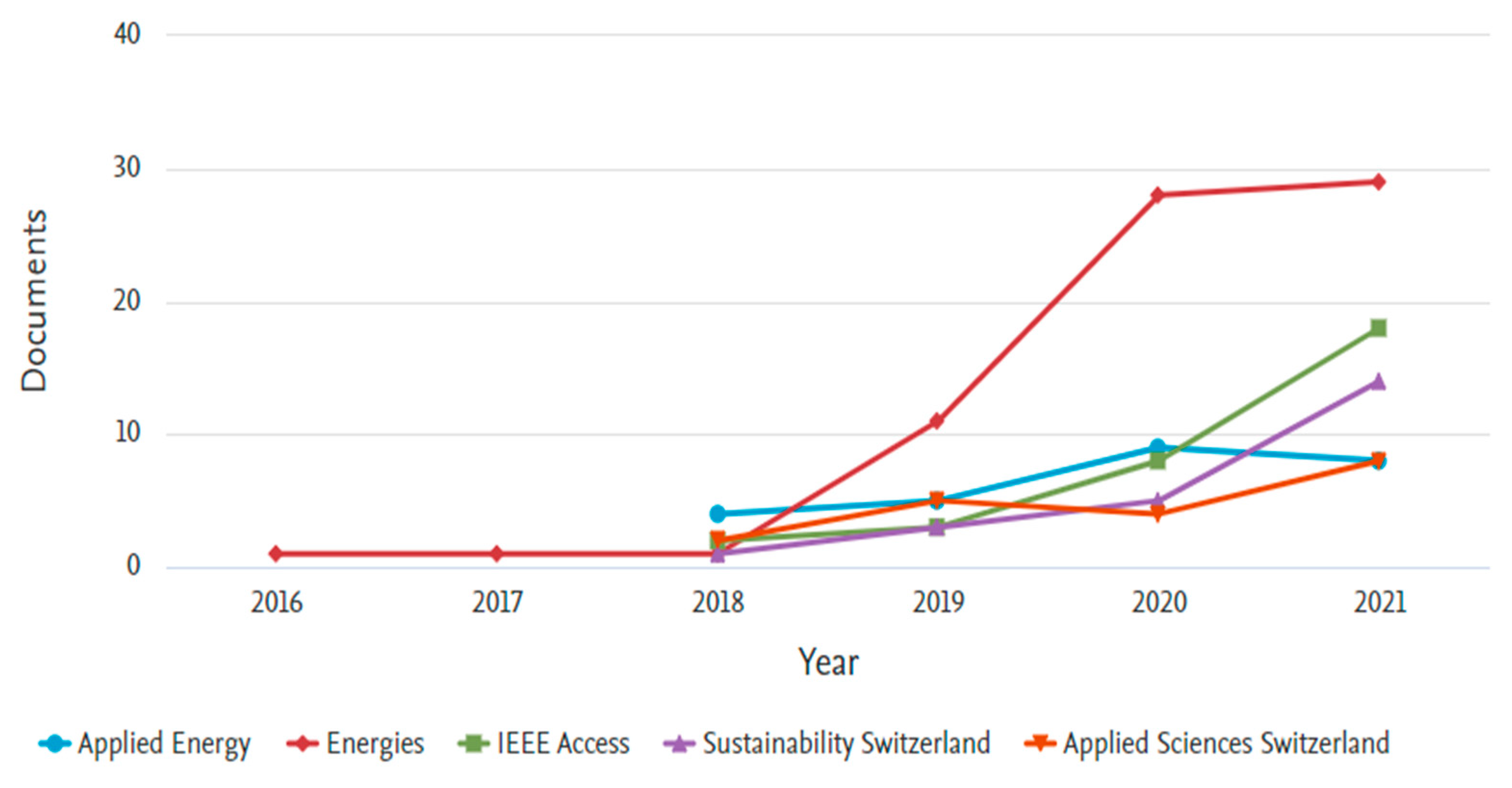

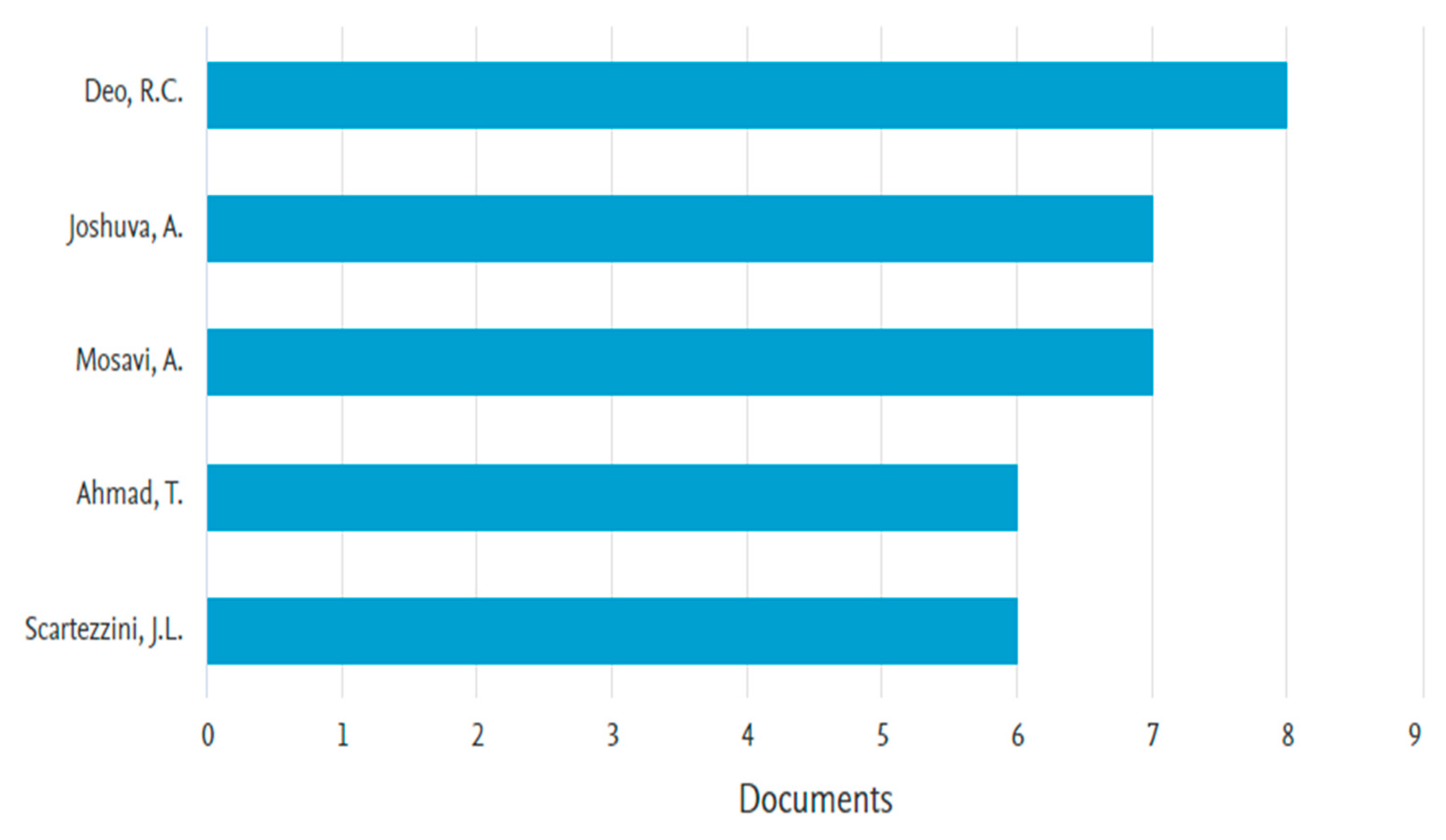
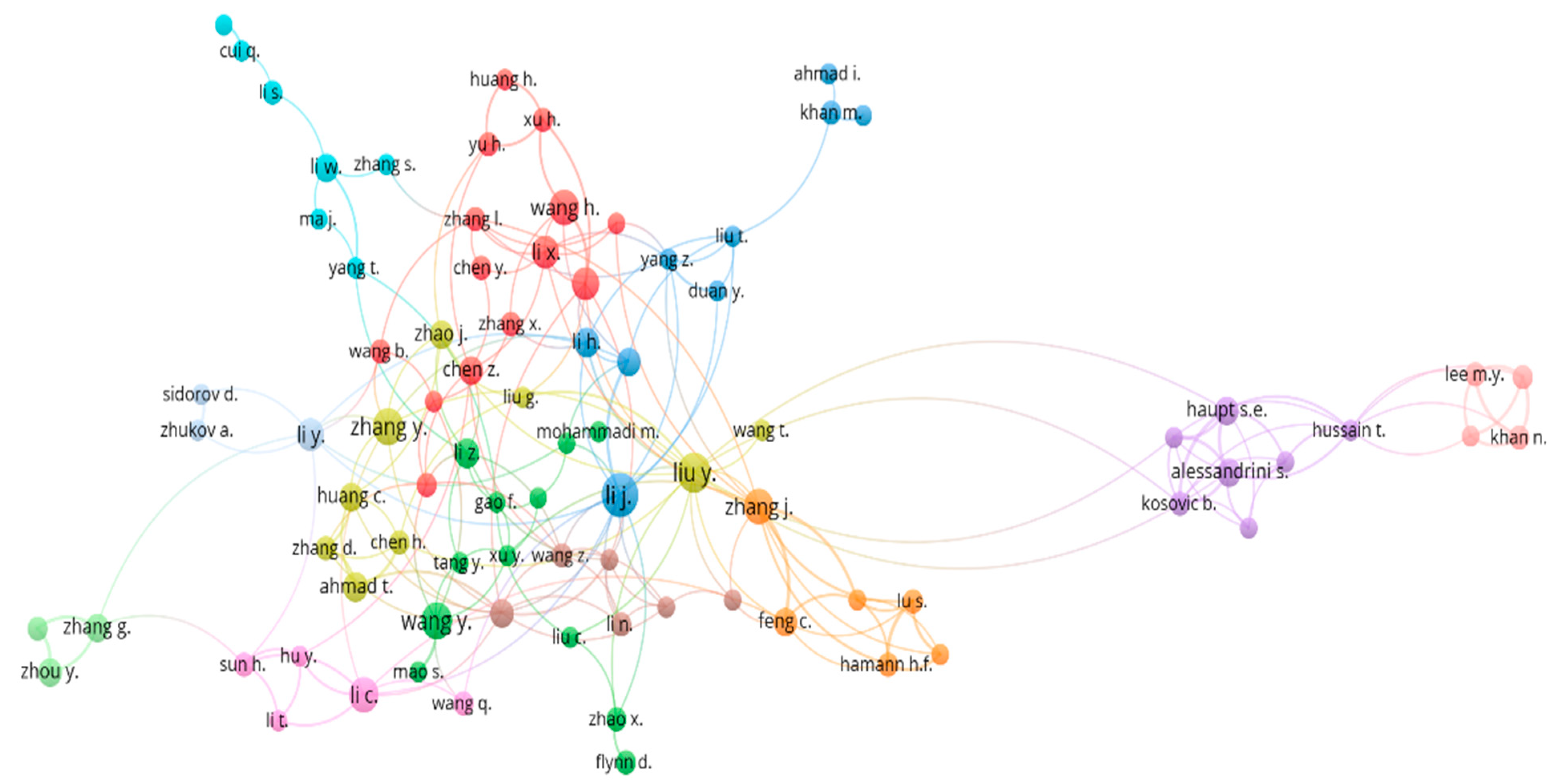
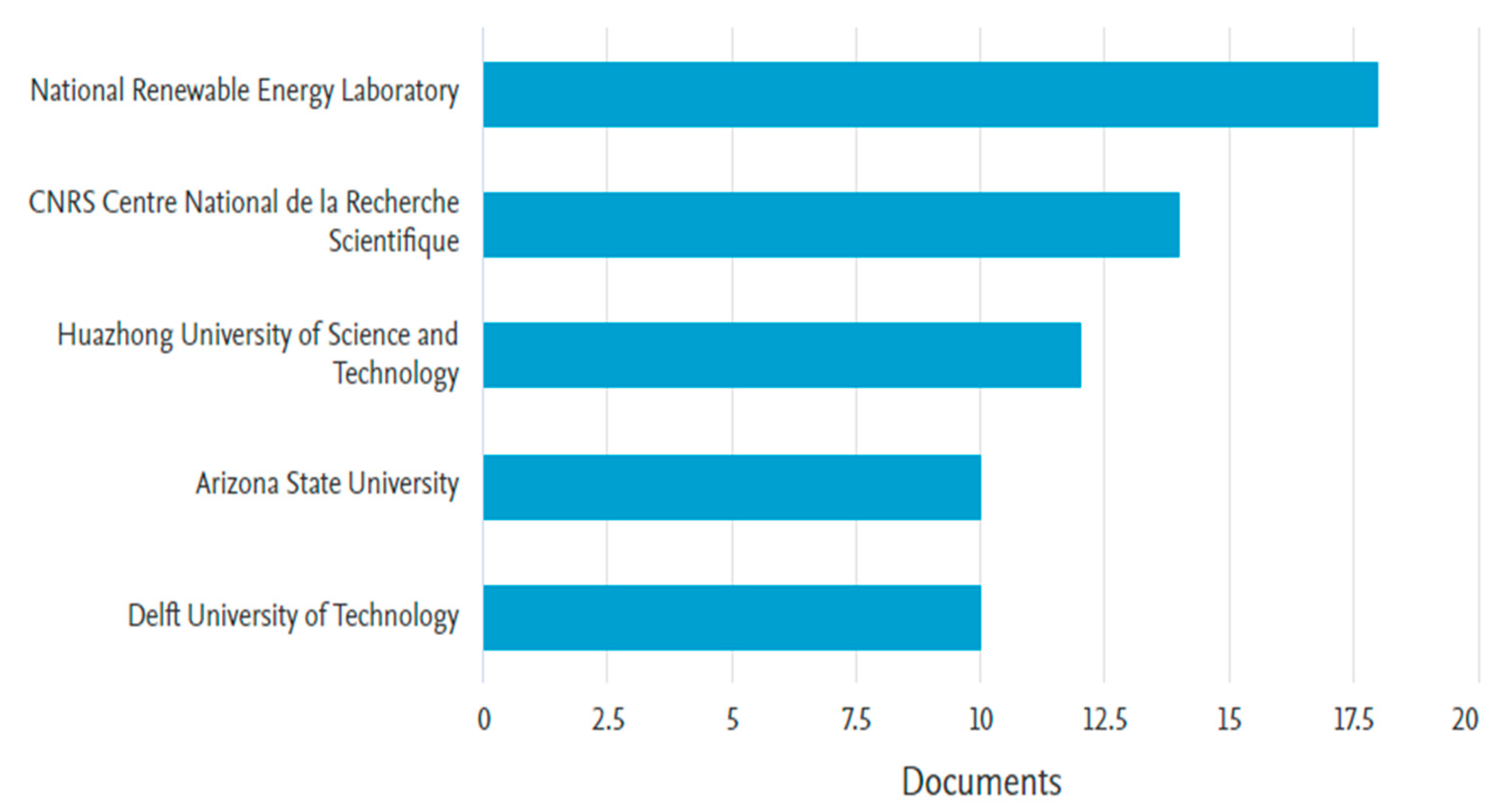

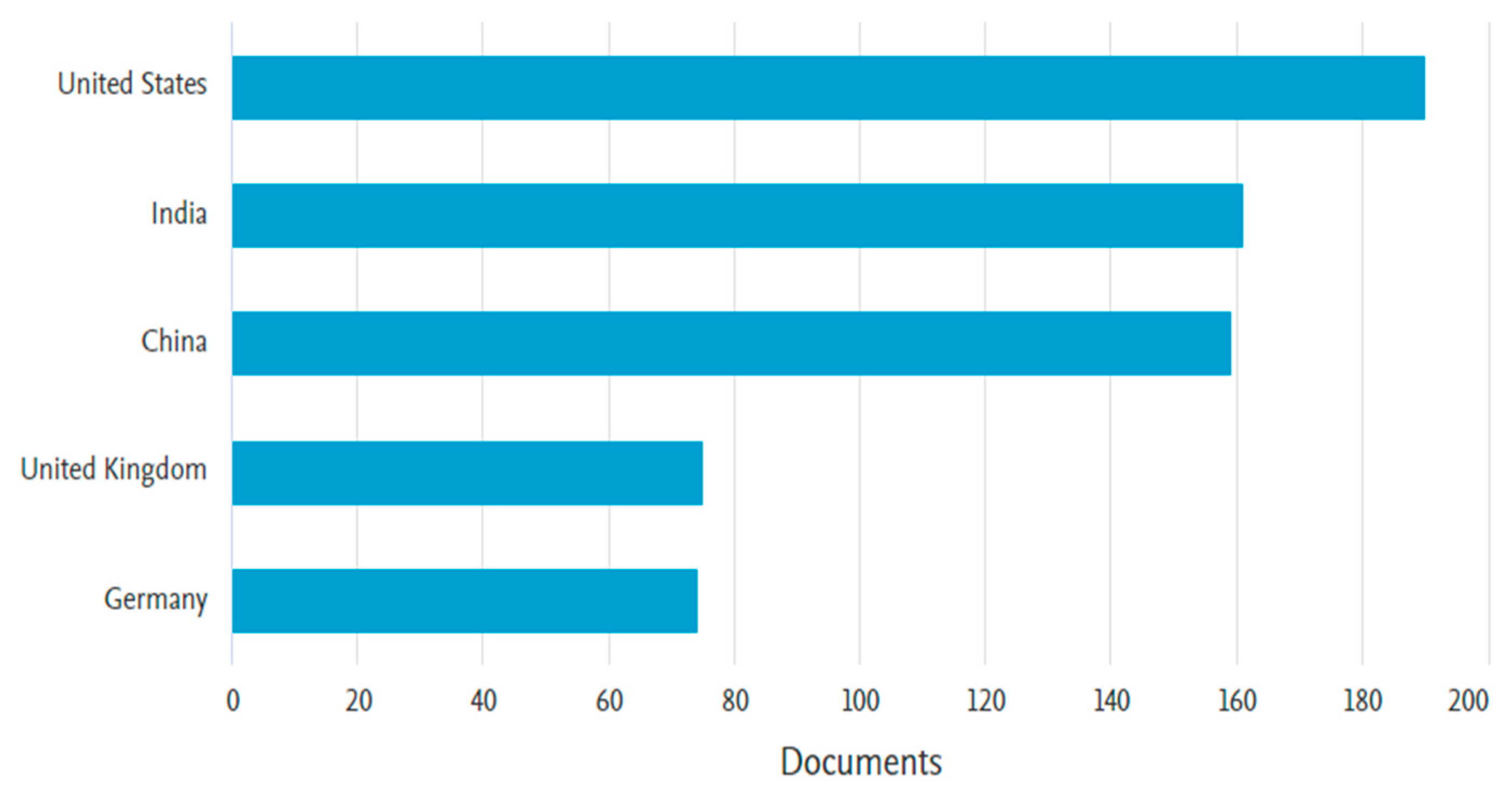
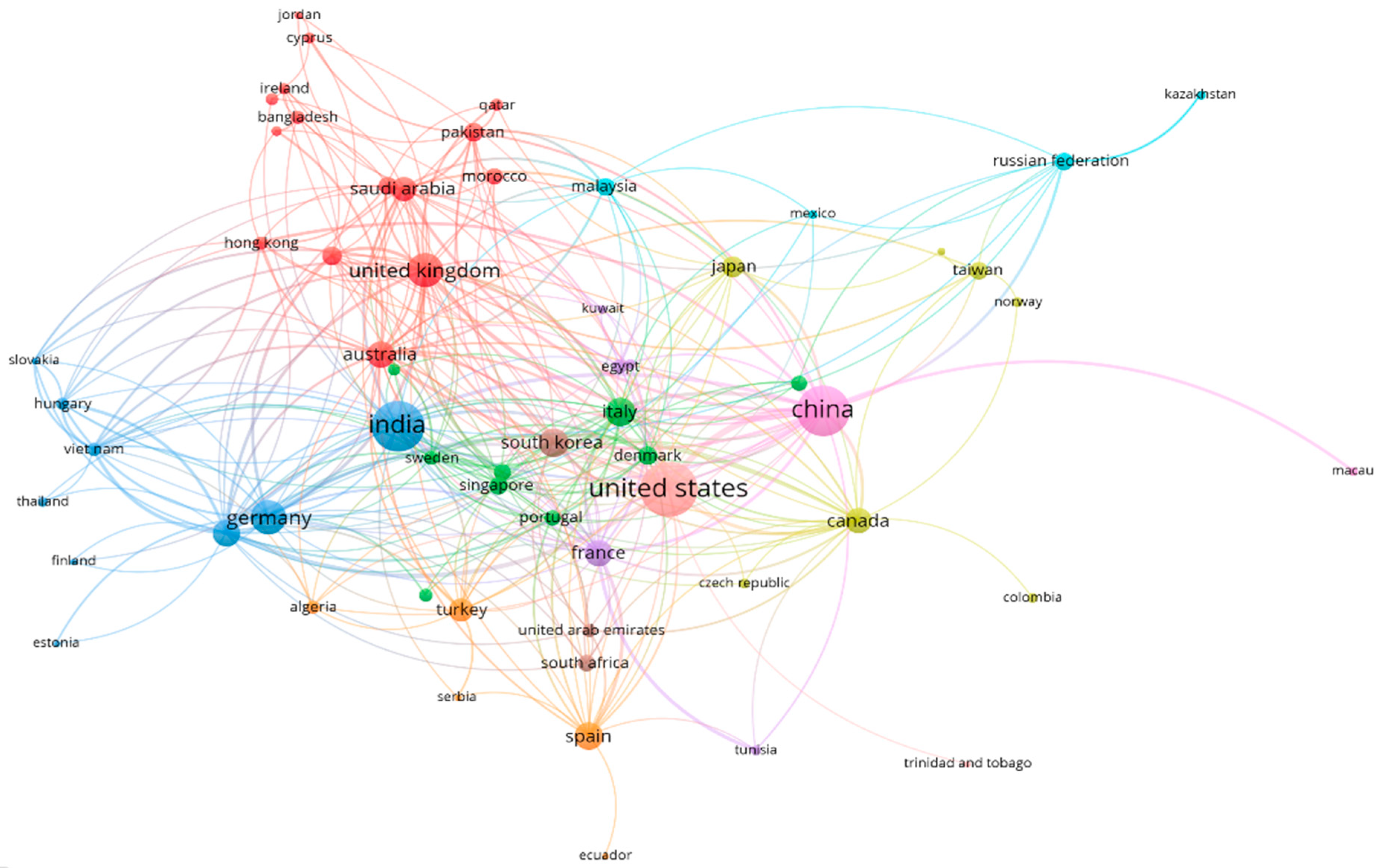

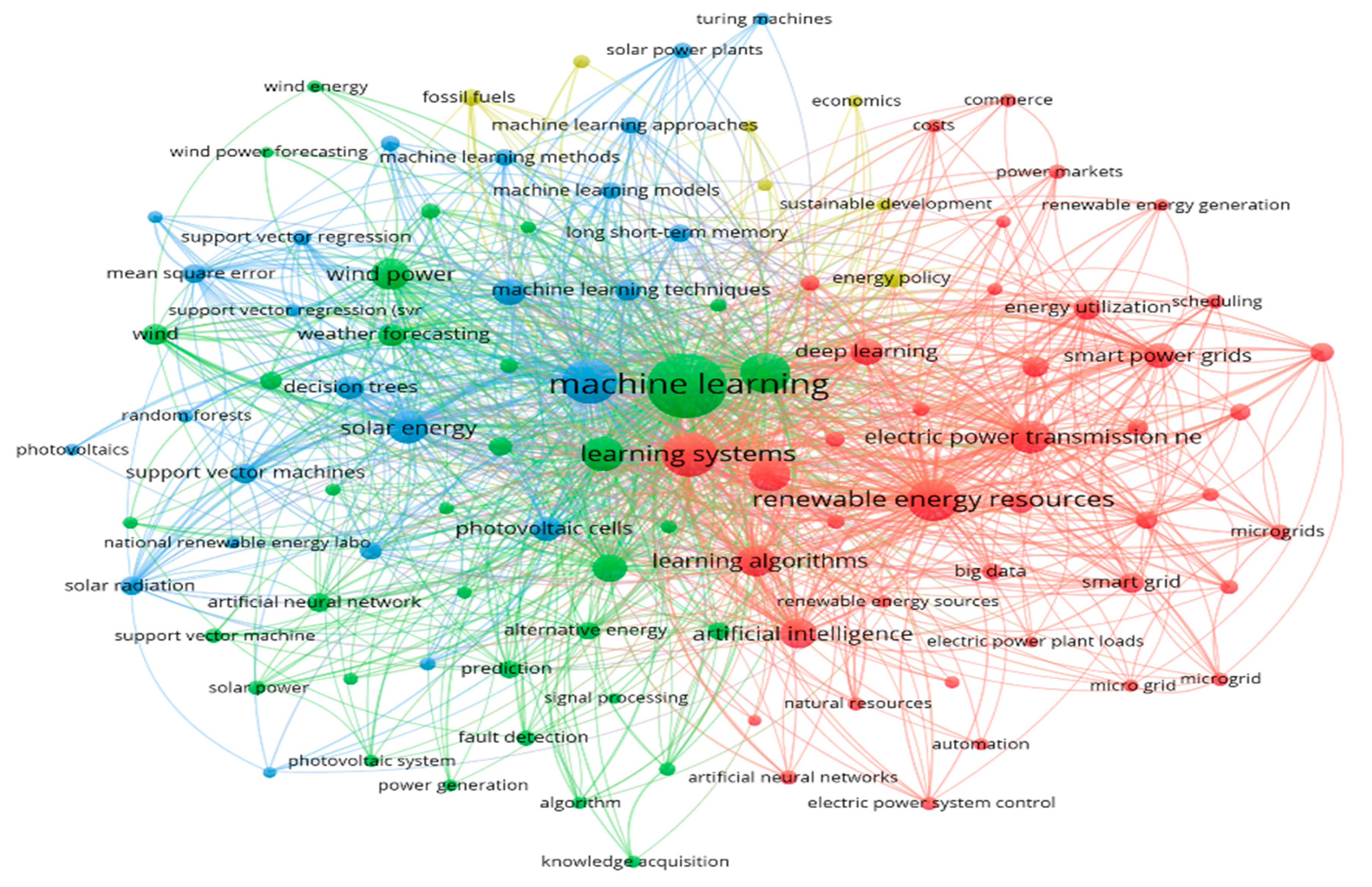
| References | Title | Year | Source Title | Cited by | Document Type |
|---|---|---|---|---|---|
| Gu G.H., Noh J., Kim I., Jung Y. [38] | Machine learning for renewable energy materials | 2019 | Journal of Materials Chemistry A | 118 | Review |
| Salcedo-Sanz S., Cornejo-Bueno L., [37] | Feature selection in machine learning prediction systems for renewable energy applications | 2018 | Renewable and Sustainable Energy Reviews | 67 | Review |
| Perera K.S., Aung Z., Woon W.L. [21] | Machine Learning Techniques for Supporting Renewable Energy Generation and Integration: A Survey | 2014 | Lecture Notes in Computer Science (including subseries Lecture Notes in Artificial Intelligence and Lecture Notes in Bioinformatics) | 45 | Article |
| Lu S., Youngdeok H., Khabibrakhmanov I., [22] | Machine learning-based multi-physical-model blending for enhancing renewable energy forecast—Improvement via situation-dependent error correction | 2015 | 2015 European Control Conference, ECC 2015 | 39 | Conference Paper |
| Lai J.-P., Chang Y.-M., Chen C.-H., Pai [39] | A survey of machine learning models in renewable energy predictions | 2020 | Applied Sciences (Switzerland) | 35 | Review |
| Magazzino C., Mele M., Morelli G. [56] | The relationship between renewable energy and economic growth in a time of COVID-19: A machine learning experiment on the Brazilian economy | 2021 | Sustainability (Switzerland) | 34 | Article |
| Ma T., Guo Z., Lin M., Wang Q. [57] | Recent trends on nanofluid heat transfer machine learning research applied to renewable energy | 2021 | Renewable and Sustainable Energy Reviews | 33 | Article |
| Rangel-Martinez D., Nigam K.D.P., [25] | Machine learning on sustainable energy: A review and outlook on renewable energy systems, catalysis, smart grid and energy storage | 2021 | Chemical Engineering Research and Design | 25 | Article |
| Ahmed W., Ansari H., Khan B., Ullah Z., Ali [24] | Machine learning-based energy management model for smart grid and renewable energy districts | 2020 | IEEE Access | 16 | Article |
| Sogabe T., Ichikawa H., Sakamoto K., [23] | Optimization of the decentralized renewable energy system by weather forecasting and deep machine learning techniques | 2016 | IEEE PES Innovative Smart Grid Technologies Conference Europe | 15 | Conference Paper |
Disclaimer/Publisher’s Note: The statements, opinions and data contained in all publications are solely those of the individual author(s) and contributor(s) and not of MDPI and/or the editor(s). MDPI and/or the editor(s) disclaim responsibility for any injury to people or property resulting from any ideas, methods, instructions or products referred to in the content. |
© 2023 by the authors. Licensee MDPI, Basel, Switzerland. This article is an open access article distributed under the terms and conditions of the Creative Commons Attribution (CC BY) license (https://creativecommons.org/licenses/by/4.0/).
Share and Cite
Ajibade, S.-S.M.; Bekun, F.V.; Adedoyin, F.F.; Gyamfi, B.A.; Adediran, A.O. Machine Learning Applications in Renewable Energy (MLARE) Research: A Publication Trend and Bibliometric Analysis Study (2012–2021). Clean Technol. 2023, 5, 497-517. https://doi.org/10.3390/cleantechnol5020026
Ajibade S-SM, Bekun FV, Adedoyin FF, Gyamfi BA, Adediran AO. Machine Learning Applications in Renewable Energy (MLARE) Research: A Publication Trend and Bibliometric Analysis Study (2012–2021). Clean Technologies. 2023; 5(2):497-517. https://doi.org/10.3390/cleantechnol5020026
Chicago/Turabian StyleAjibade, Samuel-Soma M., Festus Victor Bekun, Festus Fatai Adedoyin, Bright Akwasi Gyamfi, and Anthonia Oluwatosin Adediran. 2023. "Machine Learning Applications in Renewable Energy (MLARE) Research: A Publication Trend and Bibliometric Analysis Study (2012–2021)" Clean Technologies 5, no. 2: 497-517. https://doi.org/10.3390/cleantechnol5020026
APA StyleAjibade, S.-S. M., Bekun, F. V., Adedoyin, F. F., Gyamfi, B. A., & Adediran, A. O. (2023). Machine Learning Applications in Renewable Energy (MLARE) Research: A Publication Trend and Bibliometric Analysis Study (2012–2021). Clean Technologies, 5(2), 497-517. https://doi.org/10.3390/cleantechnol5020026








